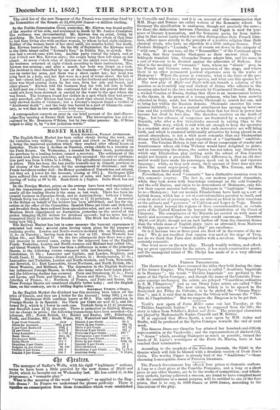(54r 4tattts.
The manager of Sadler's Wells, with his rigid " legitimate " notions, seems to have been a little puzzled by the new drama of Might and Right, which he brought out on Wednesday last. He has called it, in his Programme, a " romantic play."
What is the meaning of the word "romantic " as applied to the Eng- lish drama? In France we understand the phrase perfectly. There it signifies an-emancipation from those formalities which were established by Corneille and Racine ; and it is on account of this•emenoipation that MM. Hugo and Dumas are called writers of the Romantio school. In Germany the signification is analogous, though-not precisely the same ; for there the distinction between Christian and Pagan is used far 'pur- poses of literary demarcation, and the Romantic poets, far from indul- ging in that moral laxity which too often distinguishes their French kins- men, adhere more strictly to the precepts of a positive religion than their classical rivals, who have no objection to a little antique licence. Poor Frederic Schlegel's " Luoinde," wo of oourse set down in the category of "wild oats." At any rate, all the " Romantiker " of the Continent agree in this, that they consider Shakspere as their ancient chief. Tho Sohlegels translate him, Alexandre Dumas adapts him, and his name is a sort of war-cry to be shouted against the adherents of Boileau. But what is the meaning of "romantic" here, where no "classic" poet, in the French and German sense, has possession of the stage, and where there is no other permanent poetical repertoire save in the works of Shakspere ? Where the genus is romantic, what is the force of the pre- dicate when applied to a particular species, and what can this species bo ?
The new play of Might and Right willnot furnish a solution of the question so as to satisfy any real student of drama who adheres to the meaning attached to the two watchwords by Continental literati. Helena, a wicked Czarina of Russia, finding that there is an inconvenient heiress to the throne in the person of a young princess, who has been secretly educated in Italy, sends her favourite Obolenaki to search her out, and to bring her within the Russian domain. Obolenski executes his com- mission faithfully ; but as a mutual attachment has sprung up between him and the youthful Olga, the Czarina finds that her rival in power has become her rival in love also. She therefore resolves on the death of Olga ; but her schemes of vengeance are frustrated by a conspiracy of Boyards, who after a few vicissitudes succeed in raising Olga to the throne. This story, which is told with art enough to keep the spectator in a constant state of anxiety as to what each successive act will bring forth, and which is rendered additionally attractive by being placed in an unreal atmosphere, is not a whit more romantic than any Shaksperian drama which belongs to tho stook repertoire of a " legitimate" establish- ment. The Czarina Helena is just one of those compounde.of cruelty and licentiousness whom old John Webster would have delighted to paint ; and in constructing the drama, the author has not taken any liberties to which any Elizabethan play (setting aside the school of Ben Jenson) might not furnish a precedent. The only difference is, that an old dra- matist would have made his personages speak out in 'bold and vigorous language ; while, as they now stand, their amount of force does not rise above the usual negns-proof,—aa Mr. Phelps, Mrs. Ternan, and Miss
Cooper, must have plainly felt. .
Nevertheless, the word " romantic " has a distinotive meaning even in this romantic country. The fact is, our modem poetical dramatists, while they look down with benevolent contempt on the cold Corneille and the cold Racine, and claim to be descendants of Shakspere, only fol- low their august ancestor half-way. Shakspere is " legitimate " because he is— Shakspere ; but our modern Flivebethans have built up a sort of hybrid drama, which has a set of conventionalities peculiar to itself, and even its stock set of personages, who are almost as fixed in their vocations as the gallants and " graciosos" of Calderon and Lopez do Vega. Russia seems to stand beyond the regions of these conventionalities, as certain parts of the United Kingdom lie beyond the jurisdiction of the Court of Chancery. The conspiracies of the Boyards are carried on with mere of bustle and movement than our sober poets would encourage. Therefore Might and Right, though not an inch farther off from the classical drama than the whole mass of English plays (save as aforesaid) from Marlowe to Shirley, appears as a "romantic play" par excellence. Or is it because two or three guns are fired off in the courso of the ac- tion? We do not recollect that cannon was used at the siege of Troy, nor do we think that Paris shot Achilles with a revolver. Gunpowder is certainly romantic.
One word more on the new play. Though weakly written, and afford- ing no great opportunities for the actors, it has ranch constructive merit ; and the managerial talent of Mr. Phelps has made of it a very efficient spectacle.


























 Previous page
Previous page